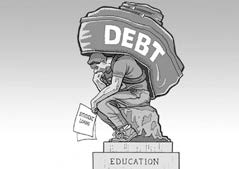By: Eryn Pinksen
Student loans are a common financial assistance plan for many post-secondary students, however a survey compiled by a Canadian accounting network states that three in four Canadian graduates regret the decision to take out loans.
In 2017, this poll from BDO Canada also found that most students wished they had saved more of their own money rather than take out government loans.
The most disconcerting information collected is that 16% of graduates have delayed pursuing a career in their field of education because of a lack of job security or a reliable income and are forced to make minimum payments on their repayment.
The study elaborates that the majority of graduates believe that students should be more frugal while in school. When they are in the repayment phase of their loan, they have had to delay important life events and financial obligation.
Due to making payments on their loan, 55% of graduates surveyed said that they have not saved properly for an emergency, 46% say that they have put off purchasing a home and 45% say that they have not saved for retirement as much as they would like to.
89% of those surveyed said that they have had to cut down on non-essential spending both while using student loans and paying them off. While this seems like an obvious saving technique, many students struggle with budgeting.
Statistics Canada completed a student debt report using the class of 2009-2010 and saw colleges created the least amount of debt accumulation, whether the loan be from the government or not.
Statistics Canada states that under National Graduates Survey from the class of 2009-2010 that college graduates had lower average debt compared to graduates from Bachelor, Master or Doctorate programs, although they had a higher amount of debt from “non-government” financial sources.
This can be explained by the fact that colleges usually have lower tuition and on average the diploma programs last only two years compared to a four year degree.
However, government loans are set to be repaid after nine and a half years once the student begins making their payment and their minimum payment is set at this repayment date. The higher the education, the more expensive tuition will be which then influences the amount of loans that are provided that will then lead to a higher monthly repayment number.
Many students are not taking the necessary risks for professional development and are instead choosing to stay in stable work positions outside of their desired industry to ensure that they are able to make their regular bills and their monthly loan repayment.
Photo Source: Steve Aoki





